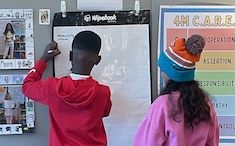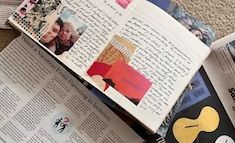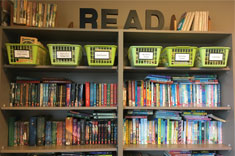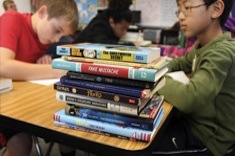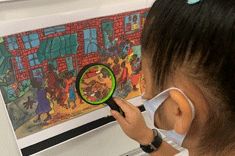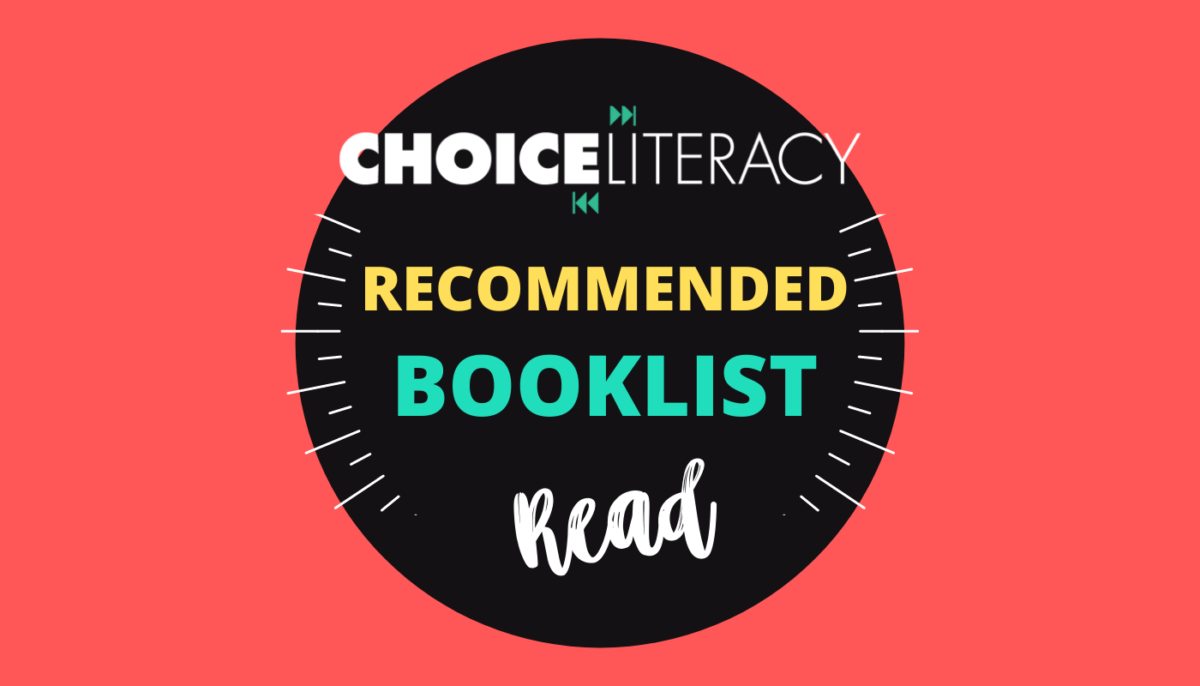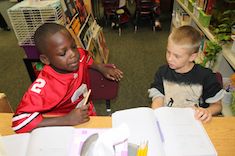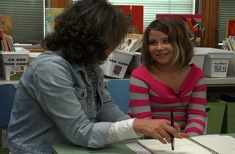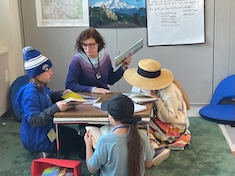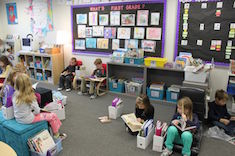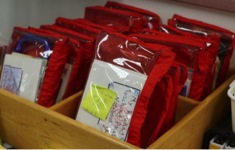3rd
Latest Content
A Strategy Lesson for “Drive-Thru” Readers
Who is a “drive-thru” reader? One who zips through the start of a book and discards it before finishing, moving ever more quickly through random books. Aimee Buckner has some minilesson suggestions for dealing with those students who can’t or won’t finish any books they start.
Dot Images: Taking Time to Reflect Brings Out Mathematical Ideas
Mallory Messenger shares a way to help students slow down and reflect on mathematical ideas. As she poses dot images to the class and collects different ways students see and count each image, students begin to reflect on key ideas. Mallory gives questions that will help students develop a stronger understanding of the concepts.
Giving Kids Time and Space to Show Their Brilliance
Mallory Messenger offers intentional ways to give students time and space to share their learning. This is easier said than done in our fast-paced, standardized-test-driven, mandates-filled world, but with a few intentional strategies, we can slow down the pace just enough to see what our students can really do.
Gratitude Week
Gigi McAllister shares the tradition of Gratitude Week. It gives students an authentic writing experience that has a ripple effect of spreading joy and gratitude throughout the school. It also shows them the significant impact that their words can have on others.
Going Deeper with Math Curricular Materials
Mallory Messenger guides us in taking what our district-adopted math curriculum resources provide and planning small changes by using problem stems and student problem posing to increase the rigor and make mathematical experiences accessible for all students.
Writing as an Act of Resistance and a Source of Strength
In this beautiful personal essay, Stella Villalba reminds us that writing is a source of strength, and developing a community of writers is essential in post-pandemic classrooms.
Launching a Classroom Library
Melissa Styger slows down the launch of the classroom library to ensure it is a valuable resource all year.
Field Experience: Supporting Independent Reading, Choice and Stamina
Helping students learn to choose books and develop stamina are important to developing independent readers. Ruth Ayres designed a field experience with opportunities to see minilessons, small group instruction, team meetings and a share session that support independence in readers.
Trusting the Letting-Go Moments
Mandy Robek writes a powerful essay about giving her students more decision-making power in sharing their learning. In the release of letting go, she found ease in the joy of learning.
Nonfiction Books for Compassion, Inspiration, and Heart
Mandy Robek set out on a quest to discover new nonfiction books with characters who offer inspiration, compassion, and heart. Here are eight new titles you won’t want to miss.
Books That Sustain the Linguistic Lives of Multilingual Learners
We need more bilingual books! Stella Villalba explains why these books are essential and provides a booklist to help sustain the linguistic lives of multilingual learners.
Talking Through Characters
Melanie Meehan shares activities that help students talk about their characters before writing about them in a realistic fiction unit.
The Shades of Sadness: Character Feelings and Traits
Melissa Quimby is disappointed with the way her students expressed depth of character traits and feelings. By building on their strengths, Melissa creates a tool for students to use and adapt as they learn to be more specific and intentional about describing characters.
Unlocking Student Thinking: The Power of Problem Posing in Story Problem Contexts
Choice Numeracy | Problem posing is a strategy that involves students creating mathematical problems to solve or reworking given problems to change them in some way. Mallory Messenger shows how this strategy allows students to explore and test their current thinking. Download the Problem Posing with Problem Stems Recording Sheet to get started in your classroom.
Book Matchmaker: 3rd Graders Reading Below Grade Level
In this installment of Book Matchmaker, Franki Sibberson shares her favorite books for 3rd graders who are not at grade level, but don’t want to read texts that will embarrass them in front of their peers.
Picture Books for Naming Emotions
Mandy Robek continues her series on picture books for understanding emotional turmoil in students. In this installment, she shares a list of books that can help children name emotions.
Connecting with Students at Home
Julie Johnson learns some important lessons about connecting with students remotely, and few of them are about technology.
Collecting Ideas in the Writer’s Notebook
Ruth Ayres confers with third grader Jade about the importance of the “collecting” phase for writers.
Forming Groups Using a Planner
Dana Murphy explains how her small-group planner is an essential tool for organizing groups in her fourth-grade classroom.
Helping Kids Lead Every Day: Changing Who “Owns” Small Groups in the Classroom
Tammy Mulligan knows the most productive and engaging discussions to build reading comprehension are not monopolized by the teacher. She creates a structure to support students to engage in deeper work with each other in small groups. This is the first part of a three-part series.
Revising Titles Minilesson
In this minilesson from Franki Sibberson’s grades 3 and 4 classroom, Franki takes students through the process of selecting and revising titles. She uses the poem “Confessions of a Reader” by Carol Wilcox as a mentor text.
Using Whiteboards Before Writer’s Notebooks
Jen Court shares the way whiteboards and conversation lifted pressure from student writers so they could create poetry.
Instructional Routines That Promote Agency for Multilingual Learners
Cultivating agency is a matter of building small, intentional moves that ask students to be part of the learning process. Stella Villalba offers three ways educators can support the growth of multilingual learners in all learning spaces.
Using Skype in the Classroom
Katherine Sokolowski has suggestions for Skype use in classrooms, covering everything from student etiquette to special events.
A Just-Right Lesson for Just-Right Books
Melissa Styger finds she needs to make changes to her just-right book lesson to meet the needs of her third-grade students.
Organizing Materials to Support Literacy Learning (Classroom Design Series Part 3)
Ann Marie Corgill shares how she organizes materials for literacy learning in the third installment of her design series.
Intentional Consolidation and Closure
Mallory Messenger emphasizes the importance of providing time for students to share their learning and offers different formats for a share session. Mallory guides us in making decisions so that share time consolidates and uplifts the learning.
Browse Content By
Type
Category
- Assessment Tools
- Big Fresh Archives
- Booklists
- Choice Numeracy
- Classroom Design
- Common Core
- Community Building
- Conferring
- Content Literacy
- Digital Literacy
- English Language Learners
- Equity
- Family Relations
- Free Samples
- Guiding Groups
- Leadership
- Literacy Coaches
- Mentor Texts
- Minilessons
- New Teacher Mentors
- Podcasts
- Poetry
- Quote Collections
- Reading Strategies
- Self Care
- Struggling and Striving Learners
- Talking and Listening
- Teacher Study Groups
- Teaching Reading
- Teaching Writing
- Word Study and Vocabulary
Author
- Melissa Quimby
- Nawal Qarooni
- Gwen Blumberg
- Julie Cox
- The Lead Learners
- Hannah Tills
- Josie Stewart
- Ruth Metcalfe
- Mallory Messenger
- Becca Burk
- Jodie Bailey
- Vivian Chen
- Mary Brower
- Tiffany Abbott Fuller
- Stephanie Affinito
- Ruth Ayres
- Leigh Anne Eck
- Heather Fisher
- Shari Frost
- Julie Johnson
- Suzy Kaback
- Gigi McAllister
- Shirl McPhillips
- Melanie Meehan
- Cathy Mere
- Debbie Miller
- Tara Barnett and Kate Mills
- Tammy Mulligan
- Dana Murphy
- Bitsy Parks
- David Pittman
- Brenda Power
- Heather Rader
- Matt Renwick
- Mandy Robek
- Christy Rush-Levine
- Gretchen Schroeder
- Jen Schwanke
- Brian Sepe
- Katherine Sokolowski
- Stella Villalba
- Jennifer Vincent
Grade Level
Choice Literacy Membership
Articles
Get full access to all Choice Literacy article content
Videos
Get full access to all Choice Literacy video content
Courses
Access Choice Literacy course curriculum and training



